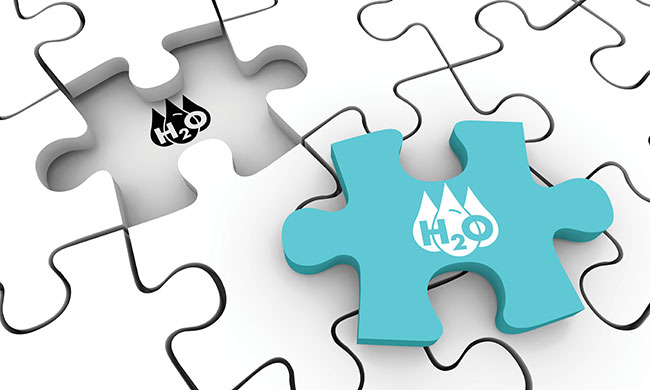
Water and the nutrient puzzle
Monica Dick
Features Barn ManagementYou should know all about the water your flock consumes.
 Photo: iQoncept/adobe stock
Photo: iQoncept/adobe stock Do you consider water to be a nutrient? Surely, most of us would answer, “Yes, absolutely!” But then why is water often the last item on our list when it comes to problem solving for bird performance issues, educating ourselves or keeping up with barn maintenance?
If we had feed with bugs crawling around in it, we would immediately begin to remedy the situation. But we tend to ignore the water on our farms even though we all know it is a vital nutrient that contributes to the performance of our birds.
Impact on development
How exactly does water contribute to the performance of your flock? It is well known that, just like people, our birds will live longer without food than they will without water. Great work has gone into making sure our birds have water in the hours that follow hatching.
Several research studies have shown that chicks that have water and feed restricted in the first 24 hours of life have stunted development of the intestinal tract. Villi (the organelles that absorb nutrients in the intestinal track) have stunted development when food and water are restricted in the first 24 hours. In fact, a study done on specifically withholding feed and/or water showed that the absence of water in the first 24 hours caused a more inhibited growth and lack of proper morphological development of the intestine and villi than even the absence of food.
Impact on feed
What about that food? Water is also a necessary component in the intake and digestion of poultry feed. Dry feed, by itself, can form large clumps in the crop of a bird. If this is not mitigated by drinking water, the clump can begin to press on the carotid artery, causing a decrease in the blood flow to the brain and putting the bird’s life in jeopardy.
Beyond that, the water is used to transport the feed throughout the bird’s system as it moves from the proventriculus to the gizzard and into the intestines.
Water is also vital to the enzymatic reactions that occur in chickens and turkeys that allows feed to be broken down and absorbed in the digestive system.
Source of minerals
The water itself may also be providing a mineral source for bird development. We don’t depend on this source, but minerals such as calcium and trace available phosphorus in our water supply can be a good thing for the development of the bird.
On the other hand, excess amounts of minerals found in our water like sulfates and magnesium can cause birds to “flush” or have diarrhea that allows the feed to pass through at such a rapid state that no nutrition is absorbed.
Absence of minerals
It’s true that we usually don’t factor in the minerals that an individual water source may be providing when calculating a feed formula. That said, the complete absence of minerals altogether can in and of itself be an issue.
Water that has all minerals removed (such as reverse osmosis water) will leach minerals from the body of the bird and from the feed it mixes with in the digestive system of the bird and can create some dangerous health conditions.
The biggest impact
Water serves a multitude of purposes on the farm when it comes to the performance of our birds. But perhaps the most impactful purpose is that of an additional nutrient in their diet.
Just as you probably know all about the feed your birds are eating, you should also know all about the water being consumed.
Mary K. Foy is the director of technical services for Proxy-Clean Products. The U.S. company’s cleaning solution is used in Canada as part of the Water Smart Program developed by Weeden Environments and Jefo Inc.
Print this page